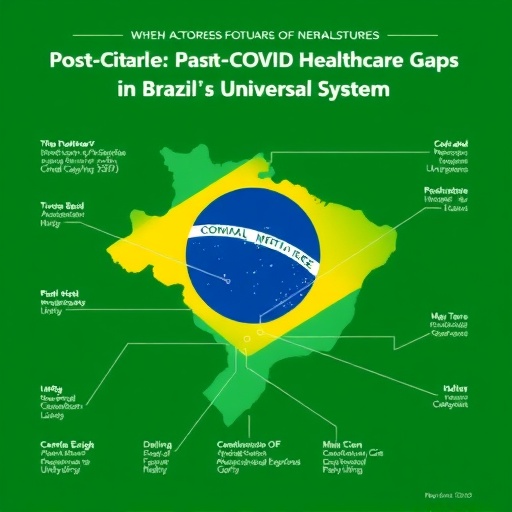As the global community continues to grapple with the long-term consequences of the COVID-19 pandemic, new research is shedding light on the often-overlooked struggles faced by patients recovering from the virus. A groundbreaking study conducted in Brazil offers deep insights into the healthcare disparities and systemic gaps that emerge after hospitalization for COVID-19, particularly focusing on the experiences of individuals suffering from Long COVID. This condition, characterized by persistent symptoms long after the acute phase, has posed substantial challenges to healthcare workers, policymakers, and patients alike.
In Brazil, the universal healthcare system—universally lauded for its inclusive intent—has paradoxically revealed significant vulnerabilities in addressing Long COVID needs. The study, designed with extensive patient engagement, identifies a complex landscape where healthcare access, quality, and follow-up services are unevenly distributed, resulting in considerable inequities. Such findings underscore the urgent need to revisit and reform healthcare approaches to post-COVID rehabilitation on a systemic level.
Long COVID, also known as post-acute sequelae of SARS-CoV-2 infection (PASC), encompasses a spectrum of symptoms including fatigue, cognitive impairment, respiratory difficulties, and cardiovascular issues, persisting for months beyond initial infection. These symptoms impair the quality of life and strain healthcare resources. The Brazilian study approaches Long COVID not just clinically but as a social phenomenon influenced heavily by systemic inequalities, economic status, geographic disparities, and health literacy.
By implementing a patient-engaged survey methodology, the researchers empowered sufferers themselves to voice their unmet healthcare needs, revealing significant barriers encountered in accessing necessary care. This patient-centric approach challenges traditional top-down healthcare assessments and highlights the benefits of incorporating those directly affected into the design and implementation of healthcare policies. The findings illustrate a disconnect between available healthcare services and patients’ realities, often shaped by social determinants of health.
One critical discovery involved the uneven distribution of specialized Long COVID clinics and rehabilitation programs, which tend to be concentrated in urban or wealthier areas. This geographic skew leaves rural and marginalized communities underserved, exacerbating existing health inequities. The study vividly paints a picture of patients who must navigate bureaucratic hurdles, long wait times, and insufficient medical guidance, resulting in gaps in post-discharge care.
Furthermore, the Brazilian universal healthcare system faces challenges in resource allocation and healthcare workforce training specific to Long COVID. Many healthcare providers lack specialized knowledge about the evolving manifestations of Long COVID, which impedes timely diagnosis and appropriate management. The study’s findings advocate for comprehensive professional education and the development of standardized treatment protocols to enhance care quality across all regions.
Economic barriers also emerge prominently. Despite the universal coverage model, indirect costs such as transportation, time off work, and out-of-pocket expenses for supplementary treatments burden many Long COVID patients. This financial strain is a barrier to consistent follow-up and rehabilitation, contributing to the persistence and worsening of symptoms.
The psychological impact of Long COVID, while less tangible, is equally concerning and often under-addressed. The study highlights that mental health services remain insufficient, despite the prevalence of anxiety, depression, and post-traumatic stress among post-COVID patients. There is a call for integrating mental health support as a core component of Long COVID care within Brazil’s healthcare framework.
Technology and telemedicine present promising avenues to bridge some healthcare gaps. However, the Brazilian study acknowledges that digital divides hinder equitable access to virtual consultations, particularly affecting elderly individuals, those with low technological literacy, and residents of remote regions. Thus, expanding digital infrastructure alongside user-friendly health technologies is imperative for inclusive access.
Patient advocacy and support groups emerge as vital resources, empowering individuals with Long COVID to share experiences, disseminate health information, and advocate for system changes. The study demonstrates that involving patient voices in policy discussions leads to more responsive and adaptive healthcare services, aligning clinical objectives with lived experiences.
Policy implications from this research stress the necessity of reevaluating healthcare delivery models to incorporate longitudinal care pathways tailored to Long COVID. Establishing integrated care networks that coordinate primary care, specialty services, rehabilitation, and social support would alleviate fragmentations that currently compromise patient outcomes.
Importantly, the study situates Brazil’s experience within a global context, noting that similar healthcare inequities post-COVID are prevalent worldwide, albeit manifesting differently depending on each country’s health infrastructure and socioeconomic factors. International collaboration and data sharing could accelerate the development of best practices and equitable strategies.
The scientific community has begun to recognize the multifaceted nature of Long COVID, bringing together virologists, immunologists, rehabilitation specialists, and social scientists to unravel the condition’s complexities. This interdisciplinary approach is essential for innovation in diagnostics, therapeutics, and care delivery, as highlighted by the study’s comprehensive framework.
As healthcare systems worldwide face ongoing waves of COVID-19 and their aftermath, Brazil’s experience serves as both a cautionary tale and a beacon. It underlines the critical importance of health equity, patient inclusion, and robust post-acute care planning, which are fundamental to overcoming the pandemic’s lingering shadows.
In conclusion, this pivotal study from Brazil spotlights the structural and social barriers impeding effective management of Long COVID within a universal healthcare system. By centering patient experiences and illuminating systemic shortcomings, it provides a roadmap for healthcare reform that prioritizes equity, inclusiveness, and resilience—principles essential in the collective effort to heal and rebuild in a world forever changed by COVID-19.
Subject of Research: Healthcare gaps and inequities experienced by patients hospitalized for COVID-19 in Brazil, with an emphasis on Long COVID healthcare needs, utilization, and barriers within Brazil’s universal healthcare system.
Article Title: Healthcare gaps and inequities following hospitalisation for COVID-19 in Brazil’s universal healthcare system: a patient-engaged survey of Long COVID healthcare needs, use and barriers.
Article References:
Portela, M.C., Escosteguy, C.C., Lima, S.M.L. et al. Healthcare gaps and inequities following hospitalisation for COVID-19 in Brazil’s universal healthcare system: a patient-engaged survey of Long COVID healthcare needs, use and barriers. Int J Equity Health 24, 275 (2025). https://doi.org/10.1186/s12939-025-02635-8
Image Credits: AI Generated




